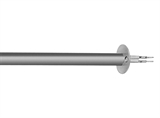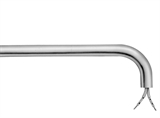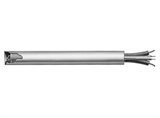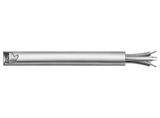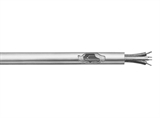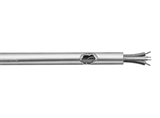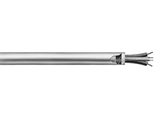
Type MFR: Mounting Flange|Round
Recommended for applications where excessive vibration exists and may cause the heater to back out of its mounting hole. The 16 ga. 304 SS flange is used as a means of securing the cartridge heater in place. The default position of the flange is flush with the lead end. Specify the position of the flange when ordering.
Sensor Options
Type TJ1 and TK1: Grounded at Disc End
The thermocouple junction is grounded to the sheath at the disc end and packed with MgO. The concave end disc is filled with silver solder and ground flat. When inserted into a flat end blind hole, it will provide fast responsive temperature readings. Widely used in Hot Runner mold probes.
Type TJ3 and TK3: Ungrounded at Center
The thermocouple junction is ungrounded and is located in the center of the length and diameter of the cartridge heater. It provides internal temperature readings of the heater core. Generally used for research applications and is not recommended for controlling process temperatures.
Type TJ5 and TK5: Grounded at Lead End
The thermocouple junction is grounded to the sheath at the lead end. A minimum of 3/8″ of cold section is required. It provides good temperature readings with quick response.
Additional Options
Type TM: Thermistor
Tempco has the ability to custom design cartridge heaters with built-in temperature sensors such as thermistors and RTDs. For specific applications that have a limited or single set point range, thermistors or RTDs in conjunction with simple electronic controllers can be an economical choice.
Type RD: RTD Temperature Sensor
Tempco has the ability to custom design cartridge heaters with built-in temperature sensors such as thermistors and RTDs. For specific applications that have a limited or single set point range, thermistors or RTDs in conjunction with simple electronic controllers can be an economical choice.
Standard Electrical Tests & Optional Test Reports
Standard Electrical Tests and Optional Test Reports
1. Resistance test — measures ohms at room temperature.
2. IR (insulation resistance) test — measures the insulation resistance to the flow of current. Standard test is done at 500VDC.
3. Hipot (high potential) test — a high voltage is applied between a product’s current-carrying conductors and its metallic enclosure to verify that the insulation is sufficient to protect the operator from electrical shock.
4. Leakage current test — measures the current that flows from any conductive part to the ground.
5. Heaters can be serialized and test reports can be sent with each shipment if required.
Die Penetrant Test
This non-destructive testing can detect imperfections in weld joints. For critical applications, each individual heater’s weld joints by end cap and fittings can be tested. Certified test reports will be sent with each shipment.

